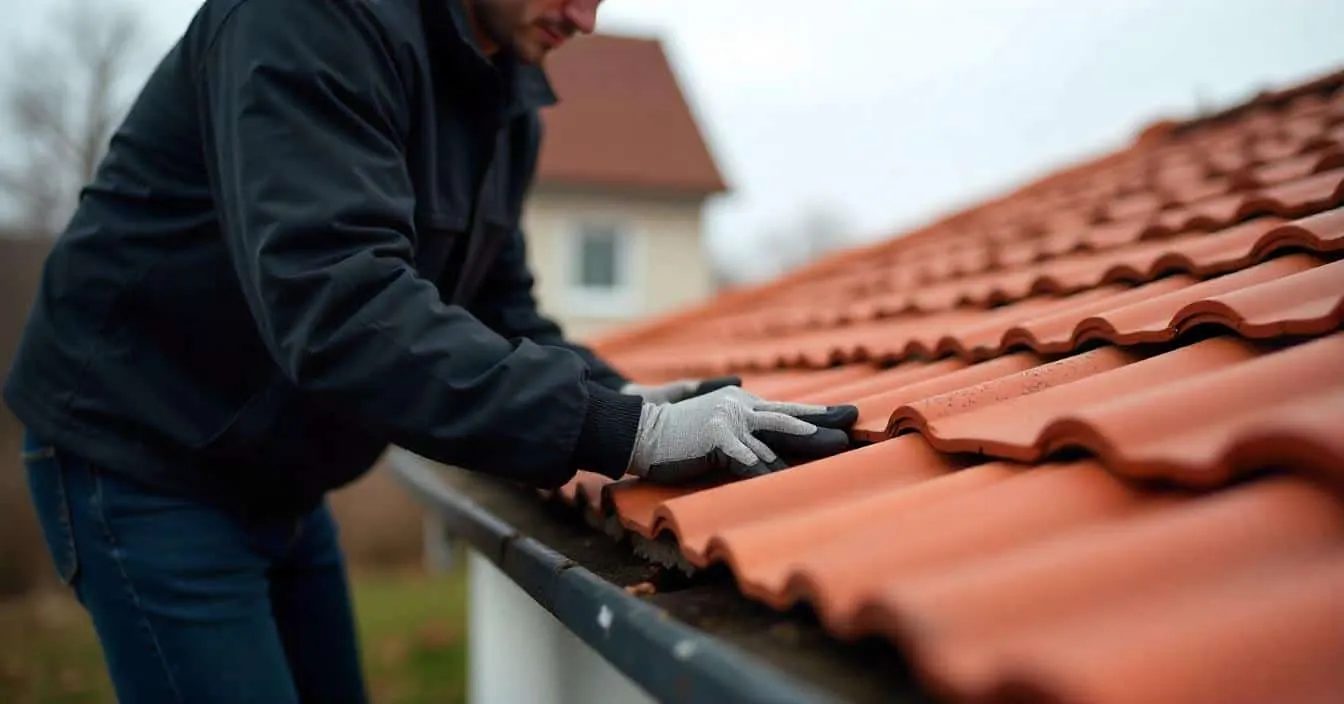One of the most important components of a house is the roof. Eventually, the roof gets damaged due to the regular wear and tear components and it might be necessary to perform repairs.
In the UK, roof replacement costs for an average-sized property generally start at around £5,000 and can reach up to £18,000+. Prices fluctuate significantly depending on the size and complexity of the roof. Simpler or smaller jobs might start from about £3,000, whereas larger or more complex structures can exceed £18,000.
Factors affecting costs include the size of the roofing area, materials (such as slate, concrete, or metal), and installation difficulty.
Roof size and complexity
The size of the roof is one of the most critical determinants of overall repair costs. Roofs consisting of more surface areas will take longer labour time to fix and use more materials, resulting in higher average costs.
Also, the complexity of the roof may influence the repair costs. Roofs with several slopes, chimneys, skylights or other intricate structures may require a lot of skill to repair, specialised tools and materials, and patchwork, increasing the costs.
Roofing material
The materials required for the repair also greatly determine the repair costs.
Damage sustained on unique material used on the roof previously costs more to repair. Should the previously used material be unavailable or depleted, repair expenses escalate due to the increased effort needed to pinpoint and substitute the compromised component.
- Location
- The sheer size of the property/roof
- Height
- Materials (Slate/tile/lead/rubber)
- Slate size and condition
- Thickness of slate
- Tile size and age
- Ridge condition
- Lead valleys
- Stacks
- Lead work
- Skylights
All these variables contribute to varying costs of roof repair work

Extent of damage requiring roof repair
The third determinant of roof repair is the extent of the damage. If there is a small repair to the tiles or lead flashing, the cost will be cheaper than a complex, more detailed repair job.
Access to the roof
If workers need easy access to your roof, then repairs are easy to complete. If it is difficult to access your roof then other, more expensive, options may need to be explored.
When the roof is hard to reach, then more equipment and power may be needed, increasing the overall cost of the repair.
Local labour and material costs
Labour and material costs vary in some areas. Places where the cost of living is usually higher may also charge more for services.
When budgeting for repairs, you must take average pricing in your area to determine the costs. Research local contractors and have them give you quotes to find the expected price.
Additional repairs
Your contractors might find a problem from the roof inspection that also needs attention.
For example, if you have damp inside your home, you must address it alongside the original repairs. You should also consider extra insulation or additional roof vents. These additional costs can make a huge dent in your budget!
Adding new features
Additional features like roof windows and solar panels offer functional and energy-efficient benefits for a home. Roof windows enhance light and ventilation but add £500 to £1,500 to the project. Solar panels, though at first quite costly, can yield long-term energy savings.
Evaluating these options with potential returns on investment can provide homeowners with valuable long-term benefits.
Permits required to perform the roof repair
Additionally, some areas require permits and, in some cases, strict building regulations must be followed during repairs. Permits usually come with administrative costs which can also increase your overall total.
Key Benefits of Roof Replacement
Replacing a roof offers various short- and long-term benefits.
- A new roof enhances a home’s appearance, boosting curb appeal and making it more attractive to potential buyers. It can also add market value, especially with the use of high-quality materials.
- Modern roofing materials and methods offer better insulation, keeping homes warmer in winter and cooler in summer, which lowers energy bills and improves indoor comfort. Old, weathered roofs with leaks, rot, or weak areas need replacing to prevent structural issues. A replacement resolves these problems, providing better protection from the elements.
- Deteriorating roofs can let water penetrate walls and insulation, leading to mould that is costly to remediate and poses health risks. Replacing a roof removes these vulnerabilities, reducing the likelihood of water damage and mould.
Additional Upgrades and Improved Home Value
New roofs are better suited for severe storms, protecting against wind, rain, and hail. Replacing a roof allows adding features like skylights or solar panels, reducing energy bills. A new roof requires less maintenance than an older one, saving time, money, and effort over the years.
Many new roofing systems come with extended warranties, giving homeowners peace of mind over their long-term investment. Replacing a roof not only improves the home’s appearance and value but also keeps the family safe, comfortable, and dry for years.
Planning a Successful Roof Replacement
A new roof combines thoughtful design, skilled labour, and periodic maintenance. Homeowners should seek estimates from reputable professionals to ensure a quality installation within a fair price range. A well-fitted, quality roof protects a property long-term, and consistent maintenance preserves the home’s value and structural integrity. Approved Roofing are proud members of the Confederation of Roofing Contractors (CORC)
Ultimately, understanding the costs and factors involved in a roof replacement helps homeowners prepare for a smooth, successful project that adds lasting value to their property.
Conclusion
To sum up, repairing a roof is a great investment.
Nevertheless, cost estimation relies on several previously mentioned factors. These include the size and complexity of the roof, the materials used, the extent of damage, accessibility, regional prices for materials and labour, extra repairs, enhancements, and local regulations.
Consulting well-established roofing companies is advisable because they are well-trained and experienced in analysing customised and situational aspects.
You should get quotes from several firms and examine your alternatives carefully for your roof’s long-term durability. Start with a quote from Approved Roofing, North West (approvedroofing.info)
The importance of hiring qualified roofers!
To ensure a successful roofing replacement, hiring qualified roofers is essential. Professional roofing contractors guarantee quality and adherence to building codes, reducing the risk of future problems and costly repairs. While DIY roofing might seem cost-effective, it poses safety risks and may not meet regulations.
Hiring professionals minimises the chance of property damage and injury.
Routine maintenance and long-term care
Routine maintenance is crucial for extending the life of a roof. Regular inspections can help identify minor issues like cracked tiles or loose flashing before they escalate into costly repairs. Detecting such problems early can save homeowners time and money, reducing the need for more expensive repairs in the future.
How much does it cost to repair a roof?
– FAQ’s –
The average cost ranges from £5,000 to £18,000+, depending on size, materials, and complexity – a roof inspection is critical for accurate quotes.
Several elements determine roofing service costs, such as the necessity for expert labour and specialised equipment. Additionally, working at elevated heights presents complexities and hazards. Material expenses and the overall cost of business operations also play significant roles. The price of the service might also be influenced by the level of demand based on the time of the year.
In the UK, there are several grant schemes in place to help homeowners with critical repairs including roof repairs and replacements. These grants typically have specific eligibility requirements, such as the type of property, income level, and nature of required repairs. To find out if you are eligible for this type of grant, it is recommended to contact your local council or housing association.
During heavy rainfall, roof leaks frequently occur when roofing materials fail to connect properly. This includes instances of damaged or absent tiles, cracked flashing near chimneys or vents, and sealants that have rotted or decayed.
As mentioned earlier, planning permission is usually not required to repair a roof in the UK. However, approval from building control is needed for most significant structural roofing repairs or total re-roofing. This requirement ensures that all construction work is compliant with building and safety standards.
Some of the grants available in the United Kingdom may help pensioners afford essential home improvements. They might cover the cost of repairing or modifying aspects of their homes to make them more energy-efficient or accessible.
However, the eligibility to access these financial programs is based on criteria such as the applicant’s income and whether they are homeowners.
Repairing part of a roof can take a different amount of time based on the level of damage and how intricate the repair is.
On one hand, repairing a small leak or replacing several tiles can take a few hours. On the other hand, it can take several days or more to replace large sections of the roof or repair structural problems.
Replacing a small leak or a few broken or missing tiles might only take a few hours.
All roofs can be repaired instead but there are many advantages to having a full re-roof instead.
Whether you choose to have an old roof repaired or decide to have a new roof there are a few things you should consider before hiring someone to complete the work for you:
- The company you use should be registered.
- The company you use should be insured.
- The company you use should be a member of a confederation (CORC or such bodies)
Not necessarily – ask the roofer before they start the work.
Roofing replacement typically includes removing old materials, installing new substrates, and making any structural repairs needed.
TL;DR
How much does it cost to repair a roof?
- The roof is an important component of a house and may require repairs due to wear and tear
- Factors that influence roof repair costs include: roof size and complexity, roofing material, the extent of damage, accessibility, local labour and material costs, additional repairs, permits
- It is recommended to get quotes from multiple roofing professionals before making a decision
- Roofers may charge an hourly or daily rate for their services
- Grants may be available for homeowners to help with the cost of critical repairs like roof replacements
- Roof leaks can occur during heavy rain due to damaged or improperly connected roofing materials
- Planning permission is not usually required for roof replacements in the UK, but building control approval is necessary for major structural repairs
- Some grant programs may be available for pensioners to help with home improvements based on eligibility criteria such as income and homeownership status
- The time it takes to fix part of a roof depends on the level of damage and complexity of the repair
- The average cost of a new roof for a UK house can range from £5,000 to £15,000 or more depending on various factors.
The life span of different roof coverings
- Slates 100-200 years
- Concrete tiles 50-60 years
- Clay Tiles 70 years
- Stone 200-300+ years even more
- Torch On Felt-15-20 years
- Rubber 35+ years
- Fibre Glass 20+ years
Repairs if done correctly should solve the issues at hand.
If a roof is starting to need repairs more frequently then it may be time to look at replacing it.
The cost-effectiveness of a new roof is clear to see.
A new roof should last a minimum of 35+ years. If repairs are being done frequently the cost of a new roof cost is pays off VERY quickly! Some repairs are extensive and can be up to a couple of thousand when a new roof cost is usually a cheaper alternative in the long term.

